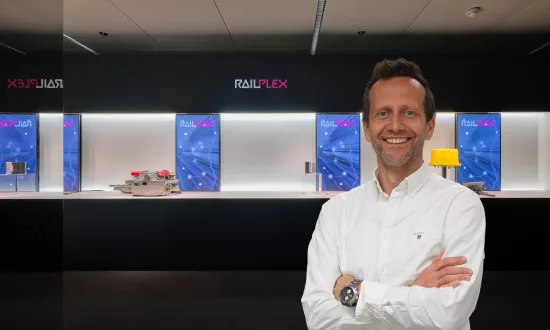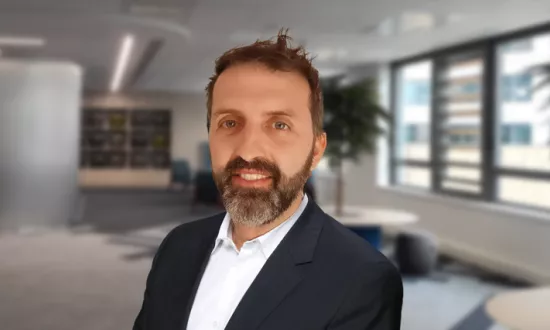Thales Researchers: Daniel Brooks
After three years working on a doctoral thesis funded by Thales, Daniel Brooks joined the R&D department at the Group's Limours site, which specialises in radar systems and air surveillance. He tells us how he has managed to strike the right balance between a passion for research and the need to meet industrial challenges.
Half of the aircraft taking off and landing at any time around the world rely on Thales systems to ensure their safety, and the technologies developed by the Group at its Limours site make a key contribution. Located about an hour from Paris, the facility opened in 1957 and now has a workforce of over a thousand employees involved in the development and integration of air defence and surveillance radars. Daniel Brooks, 29, has worked at the site for four years, the first three as a research student, and is now an AI research engineer at Advanced Radar Concepts (ARC), an R&D department whose role is to propose new algorithmic tools and simulation interfaces to the Thales business units that design ground mobile radars, multifunction radars and other advanced systems,” explains Daniel.

Practical industrial applications
After following a conventional route through his initial studies and culminating in a first degree in telecommunications engineering, Daniel took a double research master’s at the ENS Cachan engineering school, before joining Thales to prepare a thesis entitled “Deep learning and information geometry for time-series classification”. Looking beyond its intriguing title, the thesis proposes a new method for classifying drones, which conventional techniques struggle to detect at long distance due to their small size and low speed. Conventional radar systems regularly confuse them with other moving targets, such as ground vehicles, or with atmospheric turbulence or even the beating of birds’ wings. “I didn’t define the topic myself. It was suggested by Thales, in conjunction with the MLIA (Machine Learning and Information Access) laboratory, which is part of the LIP6 computer science research unit at Sorbonne Université. But it was an ideal area for me, because I wanted to address concrete challenges, so that my work could be applied to real-world products developed by a major industrial group.”
Thales funding
David's thesis, like more than 1,500 doctoral research projects every year, qualified for France's research-based training programme (CIFRE), which aims to strengthen ties between public research institutes and the private sector. Thales financed the project in partnership with the French Defence Innovation Agency (AID), and for three years David commuted between Limours and the Sorbonne in Paris. In 2021, he was awarded the Thales PhD award, alongside two other doctoral candidates, and his logical next step was to join the ARC department's Artificial Intelligence team. "I was one of the first on the scene," he says, "and we needed to build virtually everything from scratch. It was quite an exhilarating experience!"
Ramping up for business applications
AI is widely seen as one of the disruptive technologies that is going to upend our daily lives. Today it has a central role to play in Thales's roadmap for the future, and the Group expects to incorporate AI functionality in about 100 of its products in the near term. To achieve that goal, the "AI ramp-up to business" initiative creates opportunities for dedicated AI researchers to interact regularly with all Thales business areas to explore ways of leveraging AI in industrial applications at scale. "It's a good approach," says David. "It was important to move up the maturity curve in terms of our AI capabilities and available talent, but we needed to do it in a structured, progressive way. Many of our competitors are rushing into these new technologies when they have no real need for them but just want to follow the latest trends. It's refreshing to see Thales adopting a much more reasoned approach to AI investment, and it's particularly encouraging to see how these AI developments are gaining traction throughout the Group. Everything seems to fit together, and there's a real dialogue between all the different sectors and businesses involved."
A healthy professional environment

Would he encourage an engineering graduate or researcher to apply for a job with Thales? "If they want to focus on applied research and see how months of hard work in the laboratory translate into products with practical applications, I would highly recommend a job at Thales. I have managed to find an excellent work-life balance, and I really feel I'm working in a healthy professional environment," concludes the young research engineer, who now lives in Igny, about 20 miles north of Limours. He does add a cautionary note, however, about working for a company that's involved in geostrategically important areas like defence. "It comes with some strings attached," he smiles. "Lots of companies involved in AI today can simply store their data or run their AI models using cloud services from the major cloud providers. But for reasons of sovereignty, Thales obviously can't depend on American servers. Unlike companies in other sectors, we need cast-iron guarantees about the integrity of our infrastructure, the confidentiality of our data and the intellectual property of our datasets and data models. It can make life a bit more complicated, but it's definitely worth it in the end!"


